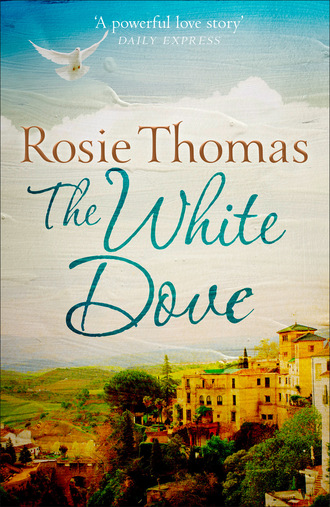
Полная версия
The White Dove
Along the endless road, and in the villages and towns where they had stopped, there had been surprising support. During the day the farmworkers in the fields and most of the drivers of the cars and lorries that rumbled past them, splashing them with filthy water from the potholes in the roads, had stared and then, when they understood, there had been encouragement and coins dropped into the bags marked ‘March for Work. March for Food.’
At nights, when they stopped dead tired in the town halls and even, once, in a huge barn still stacked with hay bales, people had brought food. Sometimes it had been local union representatives, bringing cash donations and messages of support as well as thick sandwiches and urns of strong, sweet tea. But sometimes it was different people, prosperous, middle-class and not workers, as the miners described them. These people looked shocked and sympathetic, and murmured ‘We must all do what we can to help,’ and they brought exotic pies with rich, crumbly pastry and, on one memorable night, a huge baked ham. He had been eating much better than Mari and Dickon would be doing back in Nantlas, Nick thought painfully.
He finished his soup and the last of the bread, and then reached into his rucksack. He had given most of the chocolate to a boy with a terrible cough who had been struggling to keep up almost ever since they had left Wales, but there was one square left. He had been keeping it to have as a celebration when they reached London, and he unwrapped it now and ate it slowly, thinking about Mari.
It was right that he had come, even though he had had to leave her, Nick was sure of that. The march was running under its own momentum now, already a success. Out of the seven hundred men who had left Newport eleven days ago, only a handful had dropped out, in spite of the official labour movement predictions that the miners would never make it. Even those men had had to be ordered to stop marching because their torn feet or exhaustion were holding up progress. Their dogged determination to reach London was a testament in itself, because the marchers had deliberately been chosen, by Nick and the other organizers, from the poorest and weakest of all the thousands of unemployed men across the coalfield who had wanted to march. Any man still receiving the meagre unemployed benefit or the Poor Law relief had been excluded, because no one could guarantee that he would be able to claim the money again on his return. None of the march organizers wanted to claim the responsibility for another destitute family.
Only those who had nothing were chosen, just because they had nothing to forfeit. Nick put aside the thought that he stood to lose his own benefit. That was something he would have to reckon with if and when it happened. It would have been impossible to act as a spur to the other men and not to march himself.
And the march was a success. People were with them, no one could deny that. The food, and the money in the fighting fund proved it. Best of all was the support that had come not only from workers, often in defiance of their own right-wing unions, but from the secure, middle-class people who need never have bothered to think about unemployed miners. If we can reach them, Nick thought, not the politicians, or the coal-owners, but ordinary decent people with money in their pockets, then perhaps we can get something done for us all.
He unstrapped his blanket once more and found a space to unroll it. The floor was draughty bare boards, but to Nick it felt as welcoming and comfortable as a feather bed. He wasn’t hard with working muscle any more after the months of enforced idleness, and the general shortage of food had taken its toll, but he was still fit and strong enough. Yet his legs ached all the way up into his back, and his calves and feet felt leaden with the endless walking. He rubbed the complaining muscles and reminded himself that he was comfortable compared with the older men suffering from pneumoconiosis, and the thin boys transparent with undernourishment from babyhood.
Nick carefully unlaced his boots, afraid that they might fall apart if he handled them too roughly. The sole of the left one had parted company from the upper and the two halves were bound together with rag. Yet some men didn’t even have that, and their progress had slowed to a shuffle that threatened to hold up the whole march.
He smiled suddenly. They had looked like the last tattered remnants of a defeated army long before reaching London, but the fire of spirit had burned stronger and stronger all the way. At first the sheer distance had overwhelmed them, but as the days and miles slid past they had begun to sing again, the old songs remembered from Flanders and the Somme, and the favourite hymns from the chapels in the valleys. They had talked, too, endless fiery discussions of political theory, literature, and even philosophy. Most of the men had brought books in their packs. Reading seemed to satisfy a kind of hunger when there wasn’t any food.
Nick himself had brought a fat, black volume of Paradise Lost borrowed from the Miners’ Welfare library. The magnificent, stately rhythms of the verse soothed him even though the thread of meaning was sometimes lost to him. He took the book out now, thinking that he would read a little while there was still light. But he had hardly begun when from down the crowded hall came a low, bass humming, rising and falling like the sea. Nick put his book away again. There would be singing tonight, instead.
The visiting vicar sat down on one of his wooden chairs, and the men in the kitchen stopped clanking the pans and crockery. The hall grew dark while the singing went on, and somebody brought in oil lamps flaring behind their smoky gas mantles.
The final hymn was the one that was always left until last. The singing rose and filled the hall, and drifted beyond it out into the suburban night.
Bread of Heaven, Bread of Heaven,
Feed me till I want no more,
want no more,
Feed me till I want no more.
There was no more, after that. The hall was just a crowded, stuffy room full of tired men turning on their thin blankets ready for sleep.
Nick was smiling when he fell asleep. Tomorrow they would do what they had come to do, and then they could go home.
Конец ознакомительного фрагмента.
Текст предоставлен ООО «ЛитРес».
Прочитайте эту книгу целиком, купив полную легальную версию на ЛитРес.
Безопасно оплатить книгу можно банковской картой Visa, MasterCard, Maestro, со счета мобильного телефона, с платежного терминала, в салоне МТС или Связной, через PayPal, WebMoney, Яндекс.Деньги, QIWI Кошелек, бонусными картами или другим удобным Вам способом.









